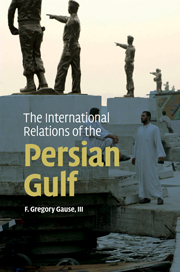Book contents
- Frontmatter
- Contents
- List of maps and tables
- Acknowledgments
- Note on the text and bibliography
- 1 The Persian Gulf as a security region
- 2 The emergence of the Gulf regional system, 1971–1978
- 3 The Iranian Revolution and the Iran–Iraq War
- 4 The Gulf War and the 1990s
- 5 9/11, the Iraq War and the future of the Persian Gulf
- 6 The Iraq War: American decision-making
- 7 Conclusions: war and alliance in the Persian Gulf
- Index
- References
4 - The Gulf War and the 1990s
Published online by Cambridge University Press: 05 June 2014
- Frontmatter
- Contents
- List of maps and tables
- Acknowledgments
- Note on the text and bibliography
- 1 The Persian Gulf as a security region
- 2 The emergence of the Gulf regional system, 1971–1978
- 3 The Iranian Revolution and the Iran–Iraq War
- 4 The Gulf War and the 1990s
- 5 9/11, the Iraq War and the future of the Persian Gulf
- 6 The Iraq War: American decision-making
- 7 Conclusions: war and alliance in the Persian Gulf
- Index
- References
Summary
The Gulf War of 1990–91 was the world's first post-Cold War crisis. It appeared to open up the possibility for profound changes in the Persian Gulf region, as the United States, unconstrained by the fear of superpower confrontation, deployed massive force to the area and defeated a major regional power, Iraq, in a brief but intense war. However, after the Gulf War dust settled, not much had changed. Saddam Hussein was weakened and constrained by draconian international sanctions, but he still ruled Iraq (though Iraqi Kurdish areas secured de facto autonomy under American protection). His ambitious effort to redraw the regional map had failed. Kuwait remained an independent state; the regimes in the Gulf monarchies remained in power. The Islamic Republic of Iran gained relatively from the defeat of its Iraqi rival in terms of the regional power game, but could do little to turn that gain into a new position of regional leadership. Rather, and in contrast to its foreign policy in the 1980s, Tehran took a more moderate, diplomatic tack in its relations with its monarchical neighbors and refrained from adventures against a weakened Iraq.
The biggest strategic change, aside from the destruction of Iraq's offensive military capabilities, to come out of the war was the development of a permanent American military infrastructure in the Gulf monarchies. That military presence hardly translated into regional hegemony. Saddam Hussein remained an irritant to the United States throughout the 1990s. American influence in Iran was nil.
- Type
- Chapter
- Information
- The International Relations of the Persian Gulf , pp. 88 - 135Publisher: Cambridge University PressPrint publication year: 2009



